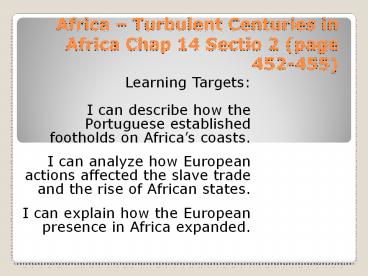Africa - PowerPoint PPT Presentation
1 / 12
Title:
Africa
Description:
Africa Turbulent Centuries in Africa Chap 14 Sectio 2 (page 452-455) Learning Targets: I can describe how the Portuguese established footholds on Africa s coasts. – PowerPoint PPT presentation
Number of Views:141
Avg rating:3.0/5.0
Title: Africa
1
Africa Turbulent Centuries in Africa Chap 14
Sectio 2 (page 452-455)
- Learning Targets
- I can describe how the Portuguese established
footholds on Africas coasts. - I can analyze how European actions affected the
slave trade and the rise of African states. - I can explain how the European presence in Africa
expanded.
2
Terms
- Mombasa a city in southeastern Kenya, located
on a small coastal island became a trading hub
for the Portuguese in Africa - Malindi a coastal town in southeastern Kenya
became a trading hub for the Portuguese in Africa - plantation large estate or farm, run by an
owner or his overseer, where slaves were brought
to work - Affonso I ruler of Kongo who wanted to
establish a modern Christian state and end the
slave trade
3
- missionary a person sent to do religious work
in a territory or foreign country - Asante kingdom 1600s, kingdom in present-day
Ghana, united by Osei Tutu - Osei Tutu military leader who unified the
Asanti of Ghana, creating an efficient, powerful
kingdom - monopoly the exclusive control of a business or
industry, such as the gold or slave trade
4
- Oyo empire late 1600s kingdom of Yoruba in
present-day Nigeria - Cape Town Dutch settlement on the southern tip
of Africa that sold supplies to ships in the East
Indies trade - Boers Dutch farmers who settled in South Africa
around Cape Town
5
During the 1400s, Portugal wanted to bypass Arab
middlemen and trade directly with Asia.
- As they moved down the West African coast,
looking for a route to Asia, they set up small
trading posts. - They traded muskets and tools for gold, ivory,
hides, and slaves.
6
Rounding the Cape of Good Hope, they sailed up
the East Coast.
- The Portuguese attacked and took Arab trading
centers at Malindi and Mombasa. - The Portuguese also traded in present-day
Zimbabwe and Zambia in East Africa.
7
In the 1500s Europeans began trading for slaves
on a large scale.
- They exchanged guns, rum, tobacco, and other
items for slaves captured in the interior of
Africa. - Slaves were sold to work on large plantations in
the new world. - Slaves were traded at castles such as Elmina
Castle in present-day Ghana.
8
Some African leaders unsuccessfully tried to
stop the slave trade.
9
The slave trade caused small African states to
disappear and new powerful kingdoms to arise.
- In the late 1600s Osei Tutu created the powerful
Asante kingdom in present-day Ghana. - By conquoring neighboring people and creating an
efficient government, he gained monopolies over
the gold and slave trades.
10
- The Yoruba created the Oyo empire, conquering
neighbors in present-day Nigeria. - In the 1600s the Oyo grew wealthy trading
captured slaves at Porto-Novo.
11
As Portugals power declined, other European
nations established footholds in Africa.
- By the mid-1600s, Britain and France reached
Senegal in West Africa. - By the 1700s, British explorers were looking for
the source of the Nile in East Africa. - In 1788 Britain established the African
Association, which sponsored exploration.
12
In 1652 the Dutch set up a colony at Cape Town.
- Cape Town was settled by the Dutch farmers called
Boers, who were strict Calvinists. - The Boers enslaved local Africans, who they
considered inferior. - Boer herders and ivory hunters moved inland,
setting off a series of wars. - They believed they were elected or chosen by God.































